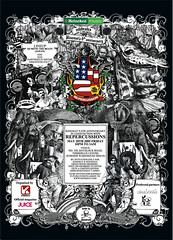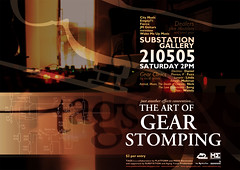Mod Music as the New Wallpaper and Whether Lyrics Matter
It was a ear-opening weekend.

Friday night saw us jiving at Kinemat's birthday party at Timberlux Centre, releasing golden brew from their green bottled prisons while more Heinekens chilled invitingly in clear ice-cube-filled green buckets, hailing the DJs and discussing the music.
Realised guiltily that I've always treated rock, pop, alternative, dance, triphop/chillout and all other modern forms of music callously; using them but never bothering to get to know them or relate to them for their instrinsic beauty. It's not too far from how European classical music is used by far too many people as elevator and toilet calmers, restaurant fillers, call-waiting soothers and IQ-boosters. Such crass consumerism without regard for the innate elegant exquisiteness and mathematical charm of such music has always made my blood boil but I'm culpable for using modern music in the same way.

The Art of Gear Stomping at the Substation the next day increased my respect for the indies, and as we sat in a parked car on Sunday, a beat-producer initiated me into the finer points of the modern band with the help of a blasting car stereo.
Realised that I haven't gone out of my way to listen to much secular music these few years because my mind is a sponge to music; it soaks up all kinds unconsciously and plays them over repeatedly and unstoppably for hours or days or even weeks. Most secular lyrics declare false worldviews that I don't subscribe to, so why would I want to be irritated by catchy lies on repeat mode in the brain?
Am just as unable to sing devotions to the "Blessed Virgin Mary" in nice Romantic-period ditties like Schubert's "Ave Maria", as the nu-metal subliminal verses of Slipknot.
What about Christian lyrics set to modern music then? Haven't gone back to look at modern Christian music since my Christmas shopping trip. There's still that perennial problem of theologically incorrect or theologically vague lyrics.
Wet blanket fundamentalism? Does it really matter what we sing about God, Jesus and the Holy Spirit?
In an article, Stuart Townend, writer of "How Deep the Father's Love", "In Christ Alone" and "Beautiful Saviour", asks
Realised guiltily that I've always treated rock, pop, alternative, dance, triphop/chillout and all other modern forms of music callously; using them but never bothering to get to know them or relate to them for their instrinsic beauty. It's not too far from how European classical music is used by far too many people as elevator and toilet calmers, restaurant fillers, call-waiting soothers and IQ-boosters. Such crass consumerism without regard for the innate elegant exquisiteness and mathematical charm of such music has always made my blood boil but I'm culpable for using modern music in the same way.

Realised that I haven't gone out of my way to listen to much secular music these few years because my mind is a sponge to music; it soaks up all kinds unconsciously and plays them over repeatedly and unstoppably for hours or days or even weeks. Most secular lyrics declare false worldviews that I don't subscribe to, so why would I want to be irritated by catchy lies on repeat mode in the brain?
Am just as unable to sing devotions to the "Blessed Virgin Mary" in nice Romantic-period ditties like Schubert's "Ave Maria", as the nu-metal subliminal verses of Slipknot.
What about Christian lyrics set to modern music then? Haven't gone back to look at modern Christian music since my Christmas shopping trip. There's still that perennial problem of theologically incorrect or theologically vague lyrics.
Wet blanket fundamentalism? Does it really matter what we sing about God, Jesus and the Holy Spirit?
In an article, Stuart Townend, writer of "How Deep the Father's Love", "In Christ Alone" and "Beautiful Saviour", asks
how much do we take care to ensure what we sing is true? And does it really matter anyway?He answers:
The Role of Songs
The first thing we must realize is that worship songs play a significant part in our lives; not only for us as musicians, but for all those who attend our services. Our congregations may hear some fantastic biblical teaching on a Sunday morning, but when they leave they're more likely to be humming one of the worship songs than reciting a section of the sermon.
Let's face it: songs stick in the mind in a way that the spoken word does not. And that means that in our daily lives we can recall truth when it is contained in a song. For example, I still sing the old chorus "For the fruit of the Spirit is love, joy, peace…" when I'm trying to remember Galatians 5!
This fact was not lost on great preachers of the past. For Luther, Newton and Wesley, the central message of their songs was the truth they were preaching in their sermons. In fact, William Booth and others changed the words to popular secular songs of the day in order to better fix biblical truth in the minds of believer and unbeliever alike.
Psalms, Hymns, and Spiritual Songs
So it's important that lyrics are true and reliable if people are going to sing them and allow them to feed truth into their daily lives. So does that mean we should restrict our song content to Scripture quotations?
While there's a strong argument for saying "yes", it is clear from Scripture and church history that the people of God have always benefited from contemporary expressions of eternal doctrine applied and expressed in a way that their generation can easily grasp. The meaning and content of Scripture should always be central to the songwriter's work; but there is value in moving beyond the mere reciting of Scripture in order to explore the meaning, much as a preacher might do in a sermon.
Doctrine and Experience
This inevitably opens up some "grey" areas for the songwriter. He/she may focus on our subjective response to a scriptural truth, or express a desire to receive experientially what we know doctrinally to be already ours in Christ. At this point it would be unfair to attach the weight of doctrinal authority to every word of a worship song.
There are many examples of this in worship songs, but one of the most talked-about is Jesus, We Celebrate Your Victory. The line "And in His presence our problems disappear" seems to suggest that all life's problems will go away with a little worship. Now, I think we all know what the song is really saying: that what seem like major problems are put into proper perspective when seen in the context of God's love and power – indeed, they disappear from view when enjoying the wonderful presence of God. But it's not a doctrinal statement on how to sort out life's problems.
Theology and Poetry
Another minefield of contention for the songwriter is the question of the poetic. Part of the power of lyric-writing lies in the use of phrases and images that impact the listener/singer. However, because images are so open to interpretation, it is impossible to ensure that they are theologically airtight.
For example, Graham Kendrick’s beautiful image, "Hands that flung the stars into space/To cruel nails surrendered", is not designed to initiate a discussion on whether Jesus had hands in heaven, or to blur the issue of Jesus becoming fully man in the flesh, but to bring home to us the wonder of the Creator of the universe sacrificing Himself for sinners.
In Perspective
Let's not overstate it. Songs do play an important part in imparting doctrinal truth; but they are not a replacement for first-hand study of the Bible, or good biblical teaching in the local church. Where these essentials are being ignored, the danger of heresy looms large, no matter how doctrinally correct the songs.
Labels: Jubal's Legacy: Music







<< Home